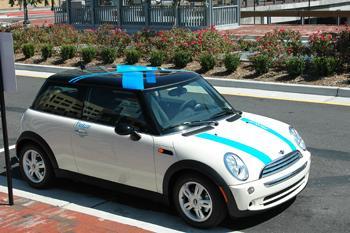Members of the campus community who don’t own vehicles and are tired of bumming rides may soon have a remedy for their situation.
Flexcar, a car sharing company stationed in 38 universities nationwide, is a car check-out system that allows members to rent cars on an hourly basis.
The University is negotiating a contract with the company to put a number of cars on campus. Details are still under negotiation.
“Do we want this to happen? Yes,” said Mark Kraner, director of Contracted Auxiliary Services. “It’s an idea that we really think is a service to campus that would be a positive all the way around.”
A student wishing to utilize the car sharing service would pay a onetime $35 membership fee, though it would be waived for University students for three months. All fees and car selections are made online.
Members would then be issued a pass card that unlocks the doors of the car they will use. Inside the car is a swipe kiosk that gives the user access to car keys and a gas card in the glove compartment. Swiping the card also activates the user’s account, allowing Flexcar to track the amount of time the car is used.
Fees for car use vary from $8 per hour to daily use fees. Members are subject to a background check on their driving records, and those deemed high-risk drivers may not be accepted for membership.
“Car sharing works in dense populations, like big cities where people have other means of transportation [such as] trains and carpools,” said Allison Freeman, Flexcar university sales manager and University alumna. “You look at campuses the same way,since you’ve got 30,000 people within a six- or seven-mile radius.”
Freeman said the popularity of Flexcar, which is present at universities like Washington State, Wisconsin and Southern California, is indicative of the general popularity of car sharing. She said this rise in popularity coincides with the increasing societal trend toward environmental awareness.
Freeman said Flexcar offsets vehicle emissions and pollution by utilizing environmental-friendly cars, including hybrids and newer, low-emission vehicles. Most of the cars the service offers are of Toyota and Honda make, and a large number of hybrids are usually available. Additionally, the range of vehicles offered includes minivans, pickup trucks and MINI Coopers.
“For every one car sharing car, we eliminate 15 personal cars off the road,” she said. “Flexcar’s entire operation is carbon neutral. We offset carbon emissions by purchasing clean energy.”
The addition of Flexcar would continue a trend of new environment-friendly programs at the University. The Environmental Conservation Organization introduced its Gold Bike program this past spring, providing a number of bikes for students to check out and use on campus. Also, Geaux Green, a student organization, recently held its first organizational meeting to discuss its goals and missions.
Kelly Williams, geography sophomore, does not own a car on campus. She said would use a service like Flexcar for trips to places like Wal-Mart.
“Depending on where I wanted to go, that’d be very appealing,” she said.
Discussions regarding insurance have delayed Flexcar from being on campus, Kraner said.
“We’re trying to negotiate with them and make this happen,” he said. “We’ve got some things that may not make it possible. Insurance will always be an issue. The University needs to make sure that everything’s right, and that we don’t put ourselves in a liability.”
Kraner said another potential issue could arise if demand for the service exceeds the number of cars available, but more cars would likely be provided in that event. Recent negotiations have slowed a bit, but with both sides involved expressing great interest, he said he expects the contract to eventually be signed. He said it could take most of this academic year to hammer out all the issues.
—-Contact Parker Wishik at pwishik@lsureveille.com
Car sharing service could come to the University
October 9, 2007

Flexcar vehicles include hybrids and newer, low-emission vehicles.



